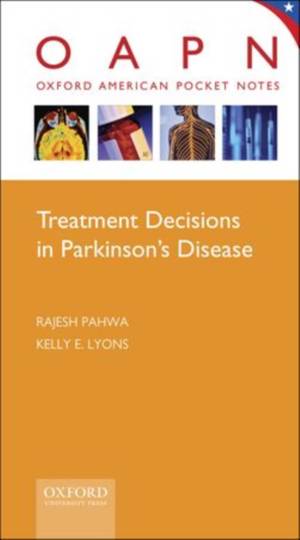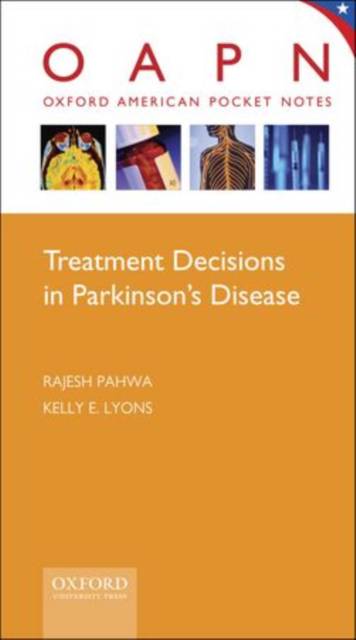
Door een staking bij bpost kan je online bestelling op dit moment iets langer onderweg zijn dan voorzien. Dringend iets nodig? Onze winkels ontvangen jou met open armen!
- Afhalen na 1 uur in een winkel met voorraad
- Gratis thuislevering in België vanaf € 30
- Ruim aanbod met 7 miljoen producten
Door een staking bij bpost kan je online bestelling op dit moment iets langer onderweg zijn dan voorzien. Dringend iets nodig? Onze winkels ontvangen jou met open armen!
- Afhalen na 1 uur in een winkel met voorraad
- Gratis thuislevering in België vanaf € 30
- Ruim aanbod met 7 miljoen producten
Zoeken
Omschrijving
Treatment approaches for Parkinson's Disease are determined by several factors: accurate diagnosis, severity of symptoms and functional impairment, adequacy of clinical response to pharmacological agents and other treatments. Often, the decision to initiate treatment, change the dosage of an existing agent or add another agent to a treatment regimen depends on careful monitoring of the timing and extent of clinical response. Optimal management of Parkinson's Disease is achieved through thorough assessment of many considerations affecting each patient, and incorporation of current evidence-based treatment protocols accordingly. The Parkinson's Disease treatment paradigm is currently undergoing changes as new agents and formulations emerge. This improved paradigm promises to provide physicians and patients with more effective symptom control, and perhaps, delayed disease progression. Filled with relevant clinical insights and guidance, this pocket volume will provide easily accessible information to help physicians integrate the updated treatment guidelines into clinical practice. This pocket guide is the first portable, concise and up-to-date resource of its kind addressing the complexities of treatment decisions for the various symptoms and challenges in PD. The volume provides practical clinical guidelines on assessment (staging) and treatment of early and advanced PD, as well as addresses associated complications. In addition to diagnosis and assessment, the handbook covers pharmacological treatments, including therapies for neuroprotection and functional impairment, dosage and administration guidelines, surgical procedures, non-pharmacological management, and management of both motor and non-motor complications.
Specificaties
Betrokkenen
- Auteur(s):
- Uitgeverij:
Inhoud
- Aantal bladzijden:
- 40
- Taal:
- Engels
- Reeks:
Eigenschappen
- Productcode (EAN):
- 9780195395624
- Verschijningsdatum:
- 16/12/2009
- Uitvoering:
- Paperback
- Afmetingen:
- 97 mm x 165 mm
- Gewicht:
- 45 g

Alleen bij Standaard Boekhandel
+ 39 punten op je klantenkaart van Standaard Boekhandel
Beoordelingen
We publiceren alleen reviews die voldoen aan de voorwaarden voor reviews. Bekijk onze voorwaarden voor reviews.











